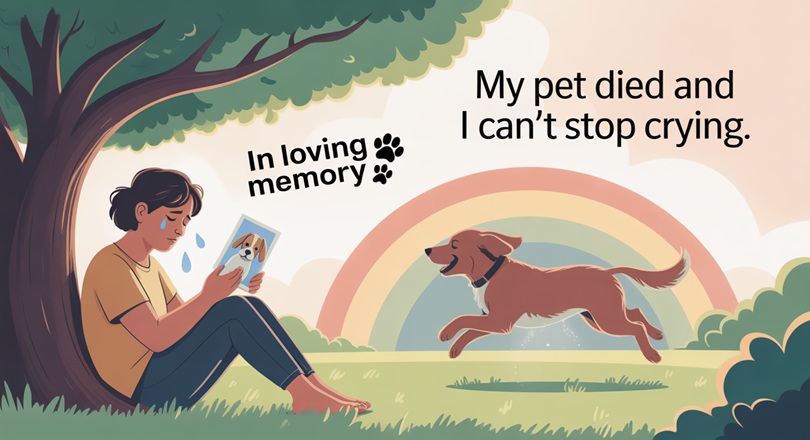Last Updated on July 5, 2025
Losing a pet can be one of the most heart-wrenching experiences of our lives. Pets are more than just animals—they are family members, confidants, and loyal companions. Their unconditional love and comforting presence leave a lasting mark on our hearts. If you’ve recently lost your pet and can’t stop crying, know that your grief is valid, and you are not alone. This article guides you through understanding, coping, and healing from the loss of your cherished pet.
Why Do I Feel This Way? Understanding Pet Grief
Pets play an essential role in our lives, bringing joy, comfort, and companionship. Hence, losing them can feel like losing a piece of ourselves. This grief stems from the deep emotional connection we form with them. Pets love unconditionally, never judge, and are always present for us, which makes their absence profoundly impactful.
It’s important to validate your feelings. Grieving a pet is not a trivial matter; it’s a reflection of the love and bond you shared. Just as we mourn the loss of human loved ones, losing a pet deserves the same level of acknowledgment and processing.
Common Emotional and Physical Responses to Pet Loss
Losing a pet can evoke a wide range of emotions and physical responses. Recognizing them is the first step toward healing:
Emotional Responses
- Overwhelming sadness and loneliness.
- Guilt, especially if decisions like euthanasia were involved.
- Anger or confusion about the loss.
- A sense of emptiness or purposelessness.
Physical Responses
- Fatigue and exhaustion from emotional stress.
- Changes in appetite or sleep patterns.
- Physical pain like headaches or stomachaches.
These reactions are natural parts of the grieving process. Allow yourself to feel these emotions without judgment.
How to Cope When Your Pet Dies
Grieving is personal, and there’s no one-size-fits-all solution. However, here are some practical tips to guide you through this challenging time:
1. Allow Yourself to Grieve
Don’t suppress your feelings. Crying helps release pent-up emotions and is a healthy outlet for sorrow. Accept that grieving is a process, and healing takes time.
2. Memorialize Your Pet
Honoring your pet’s memory can be therapeutic:
- Create a photo album or scrapbook with memorable moments.
- Plant a tree or flowers in your pet’s honor.
- Share stories or write a letter expressing your emotions.
3. Establish New Routines
Losing a pet often disrupts daily life. While it’s tough, creating new routines can help you move forward while honoring the routines you shared with your pet.
Connecting with Support Systems
Reaching out for support is crucial. It can provide comfort and reassurance when you feel isolated in your grief.
Talk to Someone Who Understands
Sharing your feelings with family, friends, or other pet owners can ease your emotional burden. If no one in your immediate circle understands your grief, consider seeking support from those who do.
Join Pet Loss Support Groups
Online forums, social media groups, or local support groups can connect you with others who’ve gone through similar experiences. Knowing that others understand your pain can be incredibly encouraging.
Consider Professional Counseling
If grief feels unmanageable, reaching out to a therapist, especially one experienced in pet loss, can provide guidance and a safe space to process your emotions.
Why Does My Dog Lick Me When I Pet Her?
Helping Children and Surviving Pets Cope
The loss of a pet can impact the entire family, including children and other pets. Here’s how you can support them:
For Children
- Use honest and age-appropriate language to explain the loss without euphemisms (e.g., avoid saying, “They went to sleep”).
- Encourage them to express their grief through drawing, writing, or creating a small memorial.
- Reassure them that their feelings of sadness are normal.
For Surviving Pets
- Pets also grieve the loss of their companions. Maintain their routines to provide stability and comfort.
- Spend extra time with them, offering affection and playtime to reduce their feelings of loneliness.
When to Consider Professional Help
If grief becomes overwhelming and interferes with daily life, it might be time to seek professional help. Here are signs to look for:
- Feelings of despair or sadness that don’t improve over time.
- Difficulty performing basic tasks or maintaining relationships.
- Physical symptoms like extreme fatigue or chronic illness caused by stress.
Therapists and grief counselors can provide coping tools and support during this difficult time.
Conclusion: Honoring Your Pet’s Memory
The grief from losing a pet is a testament to the love you shared with them. While the pain can feel unbearable at times, cherish the memories you hold. Honor your pet through gestures that keep their spirit alive and remember that healing takes time—but it’s possible.
Know that it’s okay to cry, grieve, and miss your pet. You loved them deeply, and their memory will always stay in your heart.
FAQs About Pet Loss
Why is losing a pet so painful?
Losing a pet hurts so much because of the deep emotional connection and unconditional love they gave. They occupy an integral space in our lives and hearts.
How can I cope with the death of my pet?
Allow yourself to grieve, connect with others who understand, and memorialize your pet in meaningful ways. Seek professional help if needed.
How long does it take to recover from pet loss?
Every individual heals at their own pace. Some may feel better in weeks, while others take months or even longer. It’s important to be patient with yourself.
What are the best ways to honor my pet’s memory?
Create photo albums, plant a tree, write a tribute, or contribute to an animal charity in their name. These actions help commemorate their impact on your life.
How do I explain pet loss to children?
Be honest and use clear, age-appropriate language. Encourage them to express their feelings and reassure them that it’s okay to be sad.

